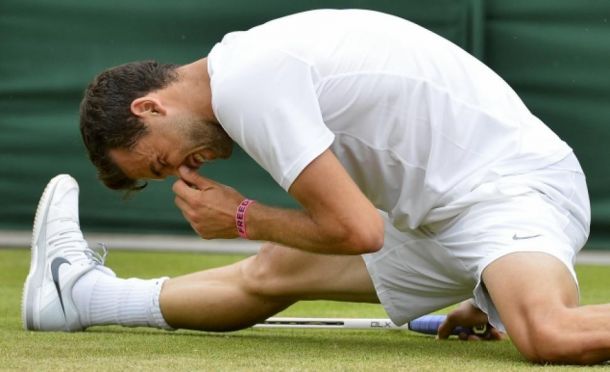For Grigor Dimitrov, this was supposed to be a year where his name would be sprinkled into the mix of potential Grand Slam winners. After all, 2014 saw him make the Australian Open quarterfinals and earn his first slam semifinal at Wimbledon. He was on the rise as he finished the year ranked 11th in the world. The union with coach Roger Rasheed seemed to suit Dimitrov and had brought forth his best results on the biggest stages. The hard work looked to be paying off for the Bulgarian.
Dimitrov's wayward 2015 season
Then 2015 happened. The early returns seemed decent enough. A semifinal in Brisbane and he made the fourth round of the Australian Open, losing to Andy Murray in four sets. Then the wheels fell off. Dimitrov went four straight tournaments without winning back-to-back matches. Sure, plenty of ATP tour pros tend to drop their level without a slam to complete for, but his losses were puzzling. In Acapulco, he lost to American Ryan Harrison in three sets. The most bizarre thing seeing him bageled in the final set of that match.
By the clay court swing in the spring, Dimitrov found his best result since the Australian Open. He would make the quarterfinals in Monte Carlo, beating Stan Wawrinka along the way. The puzzling thing though was how comprehensively he lost his quarterfinal match to Gael Monfils 6-1, 6-3. He would get through the rest of the European clay court swing with some decent results. He made the quarterfinals at the Madrid Masters, losing in the quarters to Rafael Nadal. In Rome though, he had another puzzling scoreline in a third round loss to Fabio Fognini 6-7, 6-4, 0-6. Another bagel ending for Dimitrov in the final buildup to the French Open. The end of the clay court swing in the spring came with a resounding thud in the first round at Roland Garros where he was shocked by American Jack Sock in three humbling sets 7-6, 6-2, 6-3.
The grass court swing wouldn't yield anything big for Dimitrov as the calendar turned to summer. He went 1-1 at Queen's Club, losing to Gilles Muller. At Wimbledon, he won his first two rounds in a breeze with straight sets wins over Federico Delbonis and Steve Johnson. In the third round though, it was another comprehensive loss. This one at the racquet of Richard Gasquet 6-3, 6-4, 6-4. For a man who made the semifinals at Wimbledon the year before, it signaled the need for change. The signal that most had seen weeks before.
The "breakups"
On July 6th, the first change would come as Grigor Dimitrov confirmed on Twitter that he was splitting with coach Roger Rasheed. It seemed amicable. Less than three weeks later, the most stable thing in Dimitrov's life was gone next. He confirmed his two year relationship with Maria Sharapova was over. At the time, he sounded like a weight had been lifted from his shoulders saying, "Now I’m concentrated entirely on the game. This is the summer of the new beginning of me." And that brings us to this week in Washington, D.C. where Dimitrov is playing for the first time since Wimbledon and the announcements of his relationships with Rasheed and Sharapova ending.
This columnist has long been a believer that Dimitrov needed change. His 22-13 record is not horrible this season. Yet, this is a player fancied to be part of the next wave of Grand Slam winners and that simply is not good enough. The Grand Slam results speak volumes. Australia? Solid. France? Poor. Wimbledon? Uninspired. It was well known that Dimitrov experimented with different racquets in the spring. That always seems like a bad idea and perhaps also smells of desperation to change one's fortunes. That brings us to the dual separations that have taken place in the last month for Dimitrov.
Let's begin with Roger Rasheed. Rasheed's coaching career is best noted for his five year run with Lleyton Hewitt from 2002 to 2007. During that time, Hewitt become the first Australian to reach the Australian Open final although he lost that 2005 match in four sets to Marat Safin. Rasheed also partnered up with Gael Monfils from 2008 to 2011 during which time Monfils assumed his highest ranking at seventh in the world. He also coached Jo-Wilfried Tsonga in 2013. His best result during Rasheed's reign was making the semifinals at Roland Garros. There is no denying Rasheed's influence on all those players much the same way he influenced Dimitrov's play in 2014.
Yet like many coaching relationships, it appears that after a while that Dimitrov may have tuned out Rasheed. Young players seem especially prone to this from recent experiences. This columnist would venture to say a lot of that is ego driven, with the coach maybe given a tad bit too much credit for results for some player's liking. As a one-on-one sport, you would expect as much and this columnist thinks that can fuel Dimitrov this summer. There is no better way to show people you made the correct decision for your career than by proving it on the court with wins. In this situation, that should propel Dimitrov to be focused in the build-up to the U.S. Open. It will be up to him to get those positive results.
The Sharapova breakup itself appears to have at least one lingering effect. If you believe some of the tabloid news, Dimitrov was at-fault for their split after allegedly cheating on Sharapova with a Bulgarian Playboy playmate. That however may be totally unfounded as Dimitrov announced in the last week that he is suing Nikoleta Lozanov for allegedly starting that rumor which his camp says is false. Where the truth lies in all of that is anyone's guess, but it's a sideshow distraction that Dimitrov could do without. In all though, Dimitrov seems at peace with the Sharapova decision so that part of the equation likely will not weigh on him.
It is sometimes difficult to remember that so many of these players are still very young. Dimitrov is 24 and could still have his best years ahead of him in tennis. He has had the heavy expectations put on him at a young age with the "Baby Federer" label. Roger Federer himself said a few years ago that he hoped Dimitrov would be able to shake that label. Unfortunately for Dimitrov, he appears to have shed the nickname because of the lack of Grand Slam success to-date. There is no time like the present to change history for Grigor Dimitrov. Several chapters in the book of his life have come to a close and now he's tasked with writing the next one. One that he hopes will end with a Grand Slam title or at the very least better results on the biggest stages. Perhaps that could come as soon as next month at the U.S. Open.






































